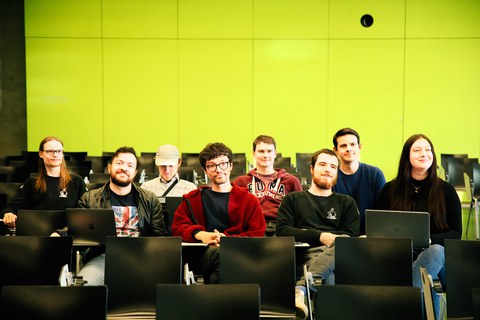Studiengang Master Informatik
+++ In den Masterstudiengang Informatik nach der Prüfungsordnung 2010 wird nicht mehr immatrikuliert. Bitte bewerben Sie sich für den Masterstudiengang Computer Science! +++
Inhaltsverzeichnis
Aufbau und Struktur
Das Studium im Masterstudiengang Informatik kann als konsekutiver Studiengang mit einem Abschluss als Master of Science (MSc.) studiert werden.
Das Studium ist modular aufgebaut. Das Lehrangebot ist auf 3 Semester verteilt. Das vierte Semester dient der Anfertigung der Master-Arbeit und ihrer Verteidigung. Das Studium umfasst 2 Pflichtmodule sowie 6 Module des Wahlpflichtbereichs, die eine Schwerpunktsetzung nach Wahl des Studierenden ermöglichen (Schwerpunkte siehe Studienordnung)
Von folgenden Basismodulen sind 3 auszuwählen und 36 LP zu erbringen.
| Studienplan1 | 1. Semester | 2. Semester |
|---|---|---|
| Angewandte Informatik | 12 LP | |
| Künstliche Intelligenz | 12 LP | |
| Software- und Web-Engineering | 12 LP | |
| Systemarchitektur | 12 LP | |
| Technische Informatik | 12 LP | |
| Theoretische Informatik | 12 LP | |
| Grafische Datenverarbeitung | 12 LP | |
| Nichtinformatisches Anwendungsfach | 12 LP | |
Im 2. Semester wird ein Vertiefungsmodul ausgewählt, welches einem der gewählten Themenbereiche der Basismodule entspricht.
| 2. Semester | 3. Semester | |
|---|---|---|
| Angewandte Informatik | 15 LP | |
| Künstliche Intelligenz | 15 LP | |
| Software- und Web-Engineering | 15 LP | |
| Systemarchitektur | 15 LP | |
| Technische Informatik | 15 LP | |
| Theoretische Informatik | 15 LP | |
| Grafische Datenverarbeitung | 15 LP | |
Die 2 von 4 gewählten Profilmodule können nur in folgender Kombination belegt werden:
| 2. Semester | 3. Semester | |
|---|---|---|
| Grundlagenforschung | 9 LP | |
| Forschungsprojekt Grundlagen | 12 LP |
oder
| 2. Semester | 3. Semester | |
|---|---|---|
| Anwendungsforschung | 9 LP | |
| Forschungsprojekt Anwendung | 12 LP |
Zum Pflichtbereicht, in welchem 48 LP erreicht werden müssen, gehören:
| 2. Semester | 3. Semester | 4. Semester | |
|---|---|---|---|
| Forschung und Entwicklung in der Informatik | 12 LP | ||
| Allgemeine Qualifikationen zur Informatik | 6 LP | ||
| Master-Arbeit + Verteidigung |
29 + 1 LP |
Inhalte
Der Master-Studiengang Informatik ist stärker forschungsorientiert. Er umfasst folgende Studieninhalte:
- Angewandte Informatik: Methoden zur Gestaltung und Beherrschung von Anwendungssystemen in all ihren Lebensphasen von der Anforderungsanalyse, dem Entwurf und Test, über die Inbetriebnahme und den Betrieb bis hin zur Wartung und Rekonstruktion
- Künstliche Intelligenz: Theorien und Methoden zur Konzeption, Konstruktion und Programmierung intelligenter Systeme, insbesondere Mustererkennung, Computational Logic, Maschinelles Lernen, Entscheidungstherorie und Autonome Systeme
- Software- und Multimediatechnik: Entwurf, Gestaltung, Test und Pflege komplexer verteilter multimedialer Softwaresysteme, insbesondere Software Engineering, Kollaborative Web-Systeme, Benutzungsschnittstellen, 3D-Modelle, Mediendidaktik und Informationsvisualisierung
- Systemarchitektur: Grundlagen von Betriebssystemen und Mikro-Kernel-Systemen, Virtualisierung, Aufbau verteilter Informationssysteme, Programmierung und Verwaltung von Datenbanken, Datensicherheit und Anonymisierungstechnologien, Aufbau und Eigenschaften von Rechnernetzen, Mobile Kommunikationstechnologien, Systems Engineering
- Technische Informatik: Aufbau, Entwurf und effiziente Nutzung technischer Realisierungen von Computersystemen, angefangen von Eingebetteten Systemen über normale Arbeitsplatzrechner und Server bis hin zu Parallel- und Hochleistungsrechnern
- Theoretische Informatik: Möglichkeiten zur formalen Modellierung und Analyse in der Informatik sowie zur algorithmischen Behandlung der dabei entstehenden Modelle
- Anwendungsfach: Grundkenntnisse in einem anderen für die Informatik relevanten Wissensgebiet.
Ziele
Das Hauptziel des Master-Studiengangs Informatik an der Technischen Universität Dresden ist es, Studierende auf die vielseitigen Herausforderungen der sich dynamisch weiter entwickelnden Disziplin Informatik vorzubereiten. Die AbsolventInnen des Studiengangs sollen befähigte Generalisten sein, die sich aufgrund ihrer breit gefächerten Fachkenntnisse und ihrer wissenschaftlichen Methodik selbstständig und flexibel wechselnden Anforderungen anpassen können. Des Weiteren sollen sie die nötige Expertise besitzen, um sich sowohl einer akademischen Laufbahn als auch einer anspruchsvollen forschungsorientierten Industrietätigkeit widmen zu können. Auch sollen sie die Grundlagen verschiedener Fachbereiche der Informatik kennen und in der Lage sein, ihre im Studium erworbene Anwendungskompetenz in konkreten Szenarien zur Problemlösung einzusetzen. Überdies sollen sie ihr Fachwissen sowohl in akademischen als auch industriellen Kontexten professionell darlegen und weitergeben können.
Durch ihr breit gefächertes fachliches Wissen sowie ihre im Rahmen des Vertiefungsbereichs erworbene Expertise in einem Spezialgebiet werden Absolventen dazu befähigt, nach entsprechender Einarbeitungszeit in der Berufspraxis vielfältige und komplexe Aufgabenstellungen in der theoretischen, der technischen, der praktischen oder der angewandten Informatik zu bewältigen.
Abschluss
Ist die Master-Prüfung bestanden, wird der Hochschulgrad "Master of Science" (abgekürzt: M.Sc.) verliehen.
Bewerbung
Die Bewerbung zum Master-Studiengang Informatik ist durch ein Eignungsfeststellungsverfahren bestimmt. Laut der Eignungsfeststellungsordnung sind folgende Nachweise Voraussetzung für die Aufnahme des Studiums:
- der erste berufsqualifizierende Hochschulabschluss in Informatik
- der Nachweis ausreichender Fachkenntnisse durch sich inhaltlich nicht überschneidende 120 Leistungspunkte aus folgenden Bereichen:
- mindestens 25 Leistungspunkte aus der Mathematik,
- mindestens 12 Leistungspunkte aus der Theoretischen Informatik und Künstlichen Intelligenz,
- mindestens 12 Leistungspunkte aus der Technischen Informatik,
- mindestens 35 Leistungspunkte aus der Praktischen Informatik, wovon mindestens 18 Leistungspunkte aus dem Bereich Programmierung / Softwaretechnologie erbracht werden müssen
- der Nachweis von Englischkenntnissen auf dem Niveau B2+ des europäischen Referenzrahmens für Sprachen
Weitere Hinweise zu den Voraussetzungen und zum Bewerbungsverfahren sind unter: Informationen für Studienbewerber des Master-Studienganges Informatik zu finden.
Weiterführende Informationen
- Studien- und Prüfungsordnungen, Studienablaufplan (Details zur Aufteilung auf Lehrformen und Präsenzlehre) sowie Eignungsfeststellungsordnung (Voraussetzungen für die Zulassung zum Masterstudiengang Informatik)
- Studienberatung
- Fachschaftsrat

